DotNext 2015 in Moscow: pushing the boundaries
The DotNext conference reached a level where, among Russian .NET-programmers, it no longer needed to be introduced: having appeared in St. Petersburg almost two years ago, she set about to conquer the capital and gathered many participants. But now, when there is no need to explain "what it is" about the recent Moscow DotNext 2015 Moscow, a new question arises: how did it differ from last year?
The answer to this question is in the detailed story about the last conference under the cut.

')
Nothing has changed with the venue: everything happened in the renowned halls of the Radisson Slavyanskaya. Among the companies whose stands are located in the lobby, appeared Kaspersky Lab. She was also more ingenious in attracting attention: at the Kaspersky stand, they were allowed to try out the game for the Samsung Gear VR helmet, which did not have a month to go, and there was no shortage of people willing to try the novelty.
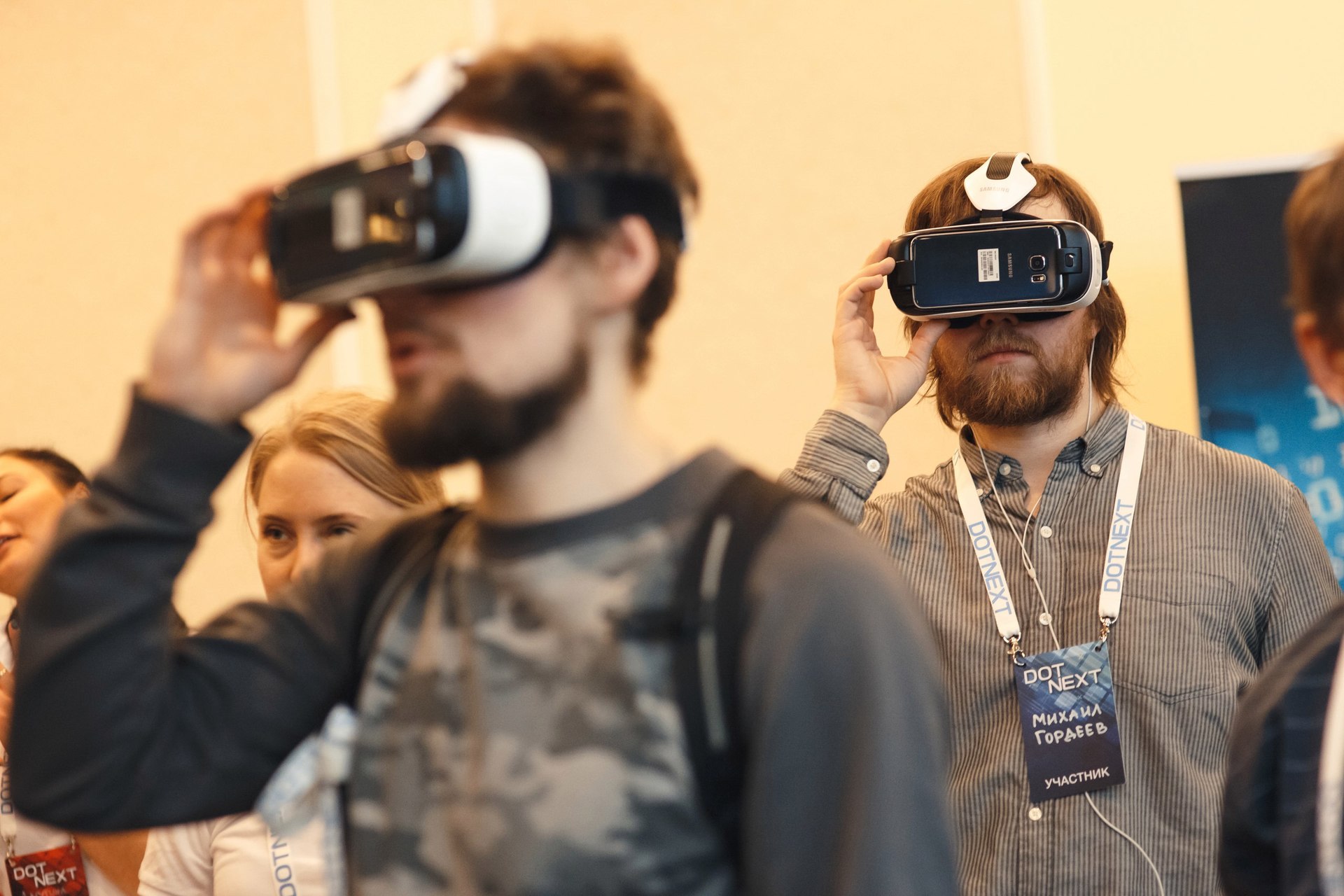
However, since they come to this conference on business, other stands also did not stand idle. Say, DevExpress doesn’t seriously lure everything with virtual reality, and the company name says nothing to people from the outside, but its products are important for DotNext visitors, so they were active.
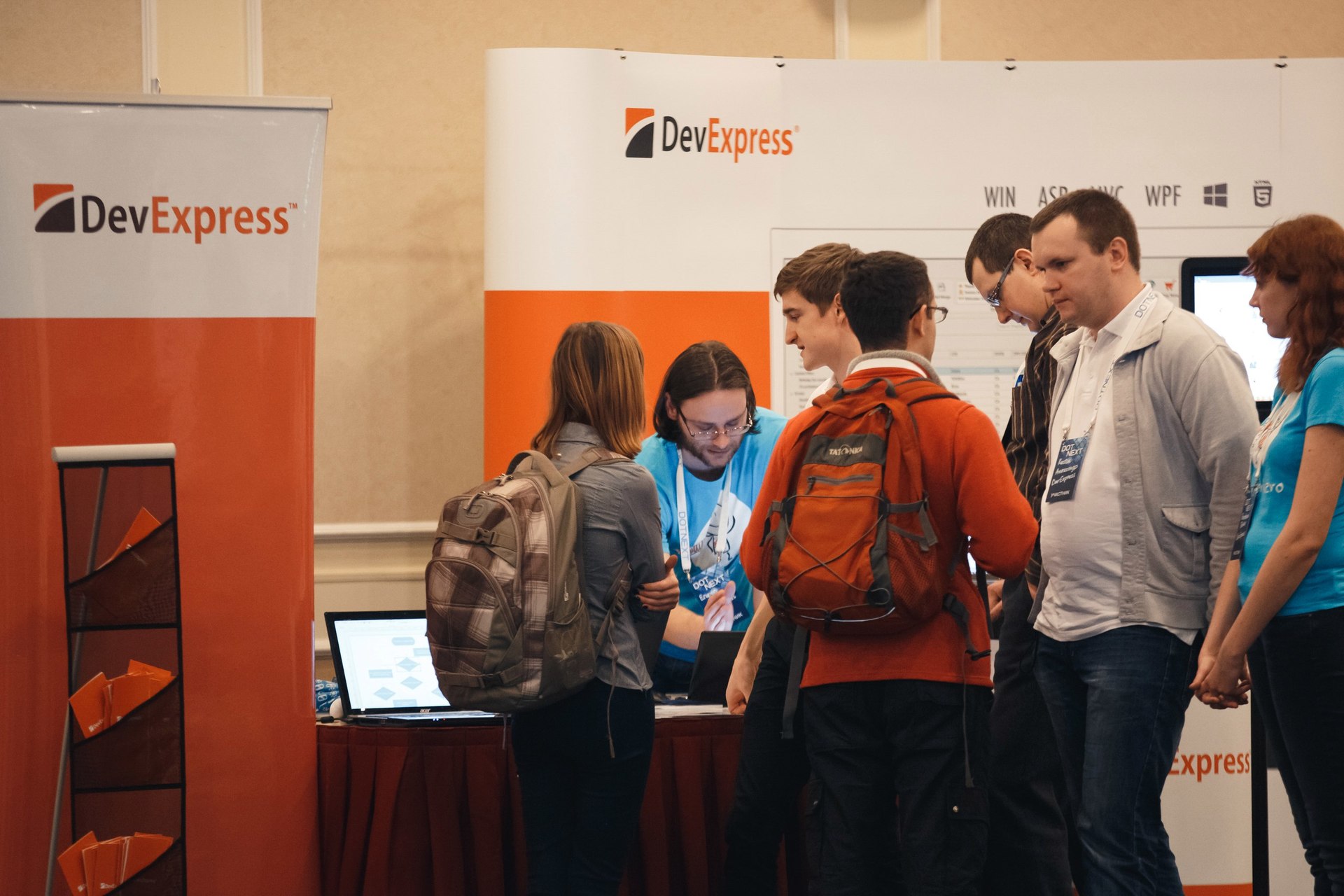
Well, at the Futurice booth one could talk about possible employment in Helsinki, Berlin, Munich, London and Stockholm - the company's offices are located in different European cities. Mikhail Samarin , business director of Futurice, systematically speaking at DotNext, does not hide the fact that the conference attracts him with the ability to search for talented personnel for the company - he spoke about this not only at the stand, but also from the stage.

And the JetBrains stand, which always attracts the attention of developers, looked unexpectedly this time too: exactly on the day of the conference, the company had a rebranding , so there was a new logo instead of the usual logo on the stand.
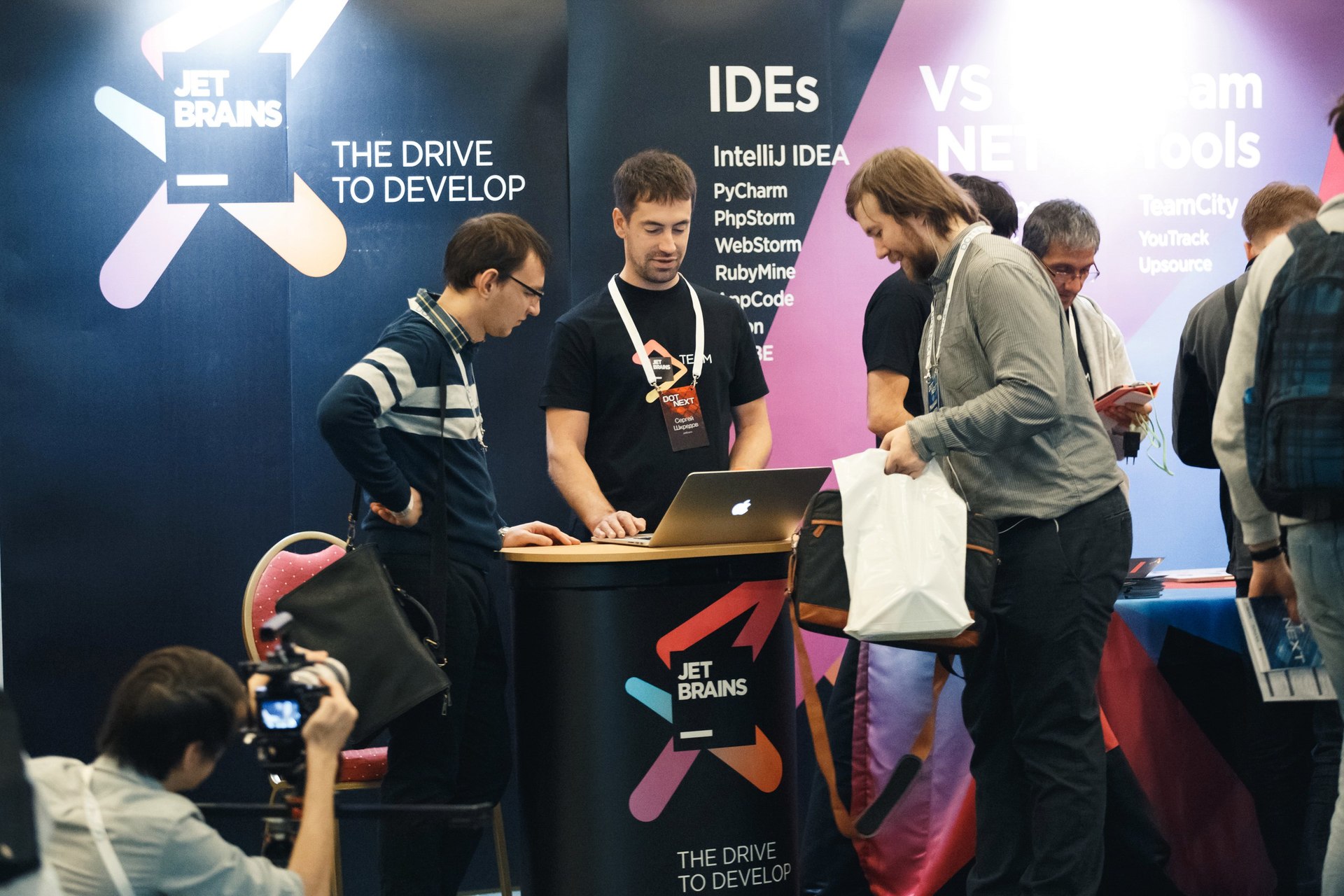
Like last year, keynote was English-speaking, and again Dino Esposito , famous in the .NET world, again made him talk about Domain-Driven Design. His expressive manner remained unchanged: “We started talking about DDD thanks to the book by Eric Evans, published in 2004, more than ten years ago. Do you understand what it means in the programming world? This is the book of the YURS PERIOD. ” The image was complemented by a New Year's cap.
In Esposito's speech, there was also a reference to George Orwell's Animal Farm, and a story about how, after the Las Vegas conferences, he had to “prove to his wife that he went there to work,” and regret that the customer cannot be told to “pay I'm more for the fact that my code is elegant ”- but at the same time he did not forget about the main theme. His performance was not a blatant praise for the Domain-Driven Design approach: it was directly stated in the speech that this approach would not be a panacea for all problems.

After the keynote, everyone dispersed in different rooms. While the same Mikhail Samarin explained what the appearance of the Universal Windows Platform means, Dmitry Nesteruk from JetBrains talked about the basics of creating bots that automate almost any manual operations.
It may seem that the recently appeared UWP requires a presentation, and in the case of bots, nothing changes, but Dmitry gave an example of a fresh situation that made them more relevant: the take-off of instant messengers like Slack and Telegram led to the flourishing of bots that could be useful in the dialogue mode. Although bots may seem to be an intuitive topic (anybody came across spam bots), those who didn’t write them could give a lot of news: for example, the idea of a hybrid approach is not obvious, the bot performs its own part of the task, but at a certain stage, the reins of government are transmitted to a living user (although I want complete automation, if it is impossible, it will be partially better than any).
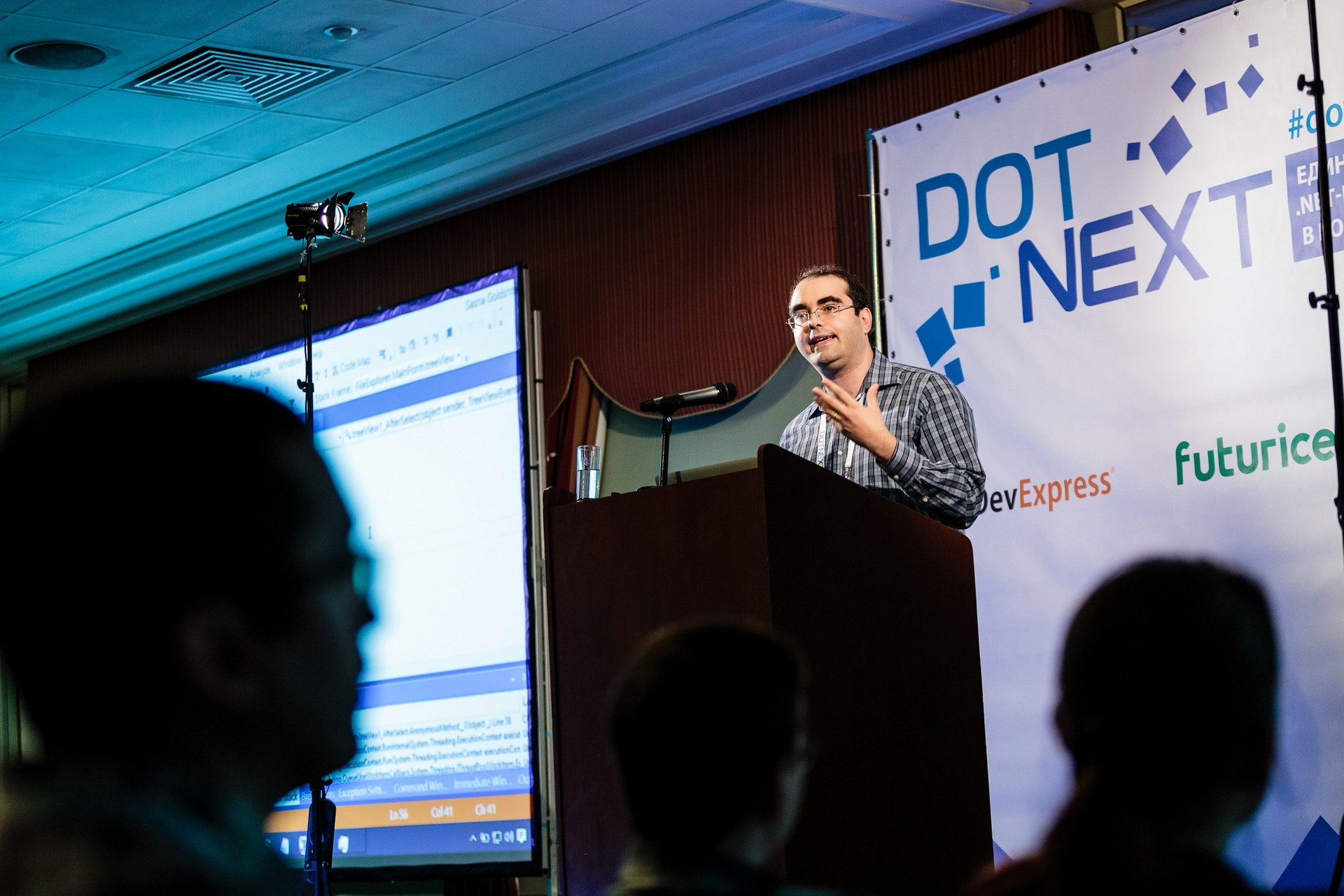
The next time slot became special: while Dino Esposito talked about the Domain Model, in another room Sasha Goldstein (Sela Group) , known in the .NET world for his book “Pro .NET Performance” , spoke about vectorization - so just two simultaneous reports Were in English, which did not happen on DotNext before. However, this does not mean that the thirsty for Russian speech had nothing to listen to at this time: for example, Nikita Governors from DevExpress talked about Xamarin.Forms , which allows mobile interface to easily port the interface to all three main platforms (iOS, Android, Windows). Since only one and a half years have passed since the advent of this technology, in the past Moscow DotNext no one could simply tell about it on the basis of long-term personal experience, and here Nikita summed up the year of active work - while frankly speaking about those moments in which the service caused inconvenience.
For example, if in iOS, single-line and multi-line text entry fields are different, then in Android it is a single entity, and as a result, Xamarin.Forms, with its desire for universality, simply does not have access to single-line in iOS. There are not so obvious, but also significant inconveniences: according to Nikita, the developers of Xamarin.Forms like to put significant changes in minor updates and even not to communicate clearly about them. An honest story about both pros and cons is what could help those present to understand how the service suits their particular project.
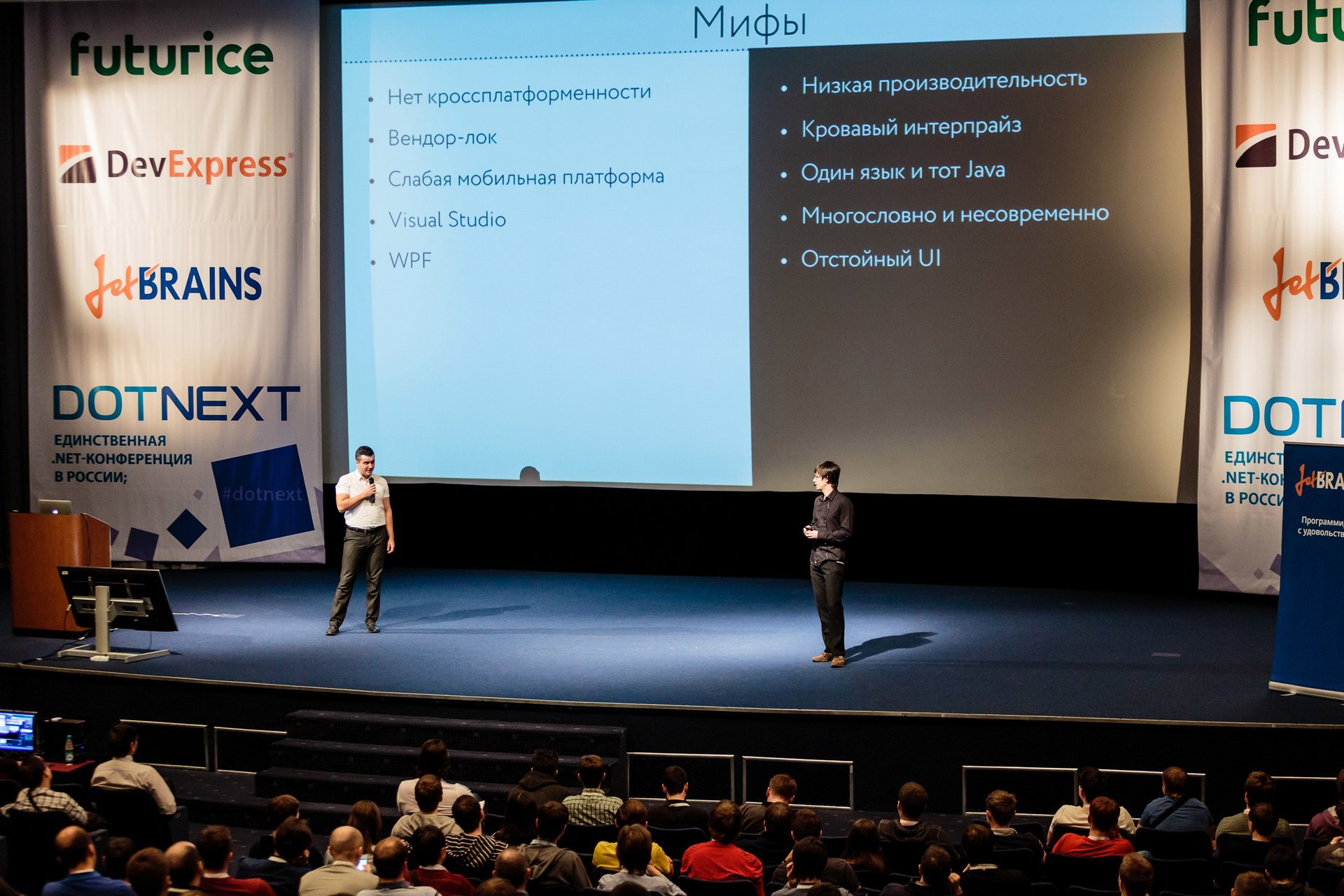
After lunch, the report in the main hall became a real show: there were two speakers, and a powerful confrontation unfolded on the scene. Roman Belov (JetBrains) immediately honestly admitted that he “switched to the dark side of the Force”: .NET is familiar to him not by hearsay, but now he prefers the Java platform (it’s scary to say this in person to hundreds of dotnetchikov) and participates in the development of the Kotlin language. Dmitry Ivanov , on the contrary, was on the “light side”.
Together, they built the entire report on comparisons of two worlds - and they came so meticulously that all the slides were divided in half into “dark” and “light” halves, and even their clothes corresponded to this. As usually happens in such programmer holivarahs, there was no one-sided dominance of one party over the other - but in the process of their confrontation, viewers could learn something about both of them. There were moments when the hall laughed amicably: “we call this operator“ I swear to my mother! ”

The next English-speaking speaker appeared in the next block: Hadi Hariri from JetBrains talked about HTTP / 2. If you are not interested in the question, it may seem that “the new version of the protocol is so important when the Internet is faster without it,” but the report quickly explained: the question is not throughput (capacity), the question is latency. You can quickly download giant files, but for a bunch of small files (with which we are dealing with HTTP now), this is not the case. If the beginning of the download of each small file is preceded by a delay, then it will constantly be felt. HTTP / 2 is designed to solve this problem and simplify the lives of developers who use HTTP 1.1 in their tricks. However, there are also some tricks and difficulties in the case of the new version of the protocol - and they are also about. In the end, Hadi recommended to everyone who wants to understand the subject more deeply, the book by Ilya Grigorik “High-Performance Browser Networking” .
Then Sasha Goldstein spoke for the second time that day - this time he spoke about the automation of error handling. As he noted, of course, you can manually disassemble hundreds of crash dumps, but this requires a lot of working time and at the same time means a large amount of mechanical “computer-like” work - so it makes sense to entrust this work to a computer. The report was devoted to exactly how to do it.
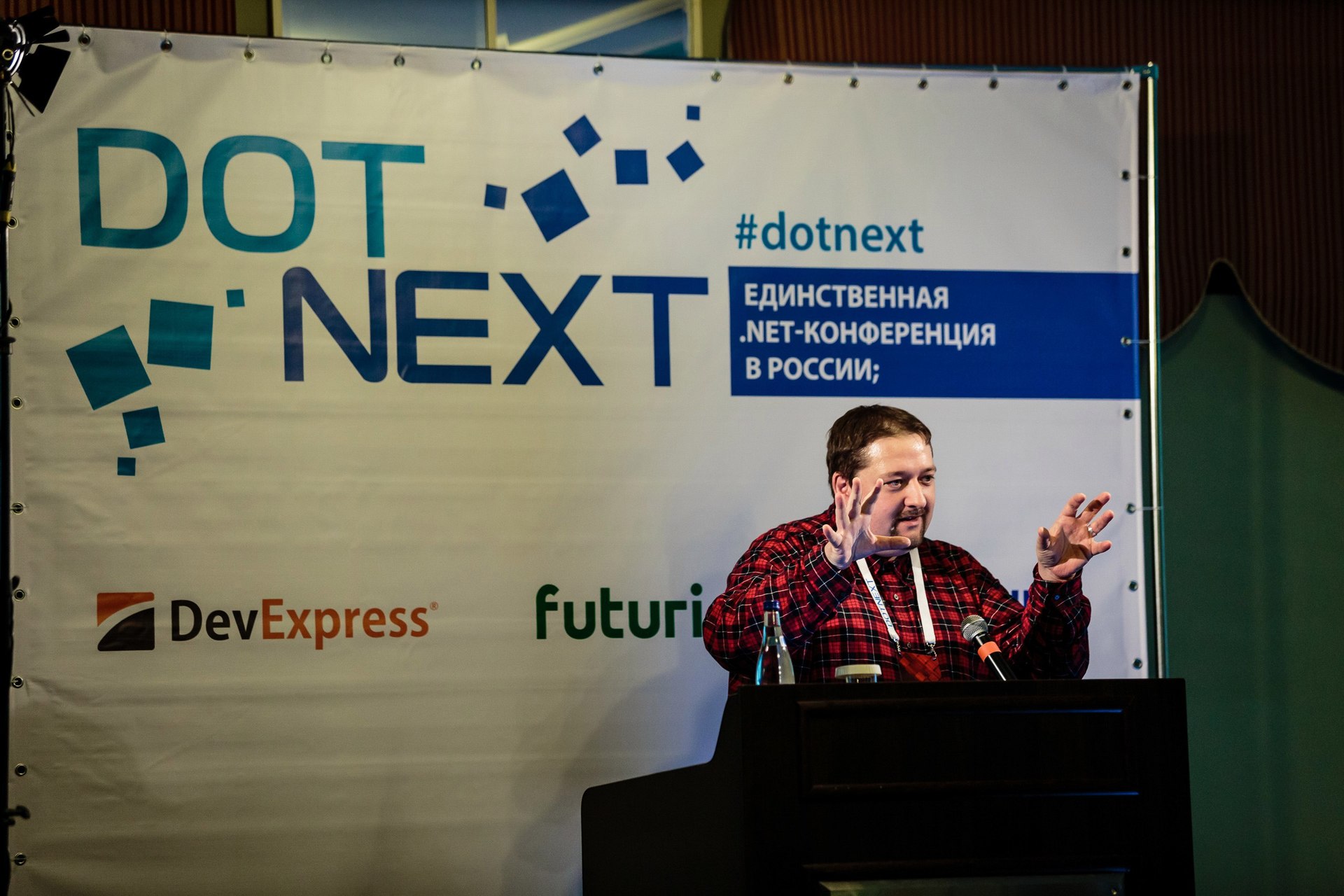
In the penultimate slot there were two reports at once, remarkable not only by topics, but also by speakers. “Functional programming on F # in big data processing and machine learning” is important at least because of how actively machine learning now declares itself, and Dmitry Soshnikov from Microsoft was talking about it - so without a company with which the name itself is instantly associated .NET, the conference has not done.
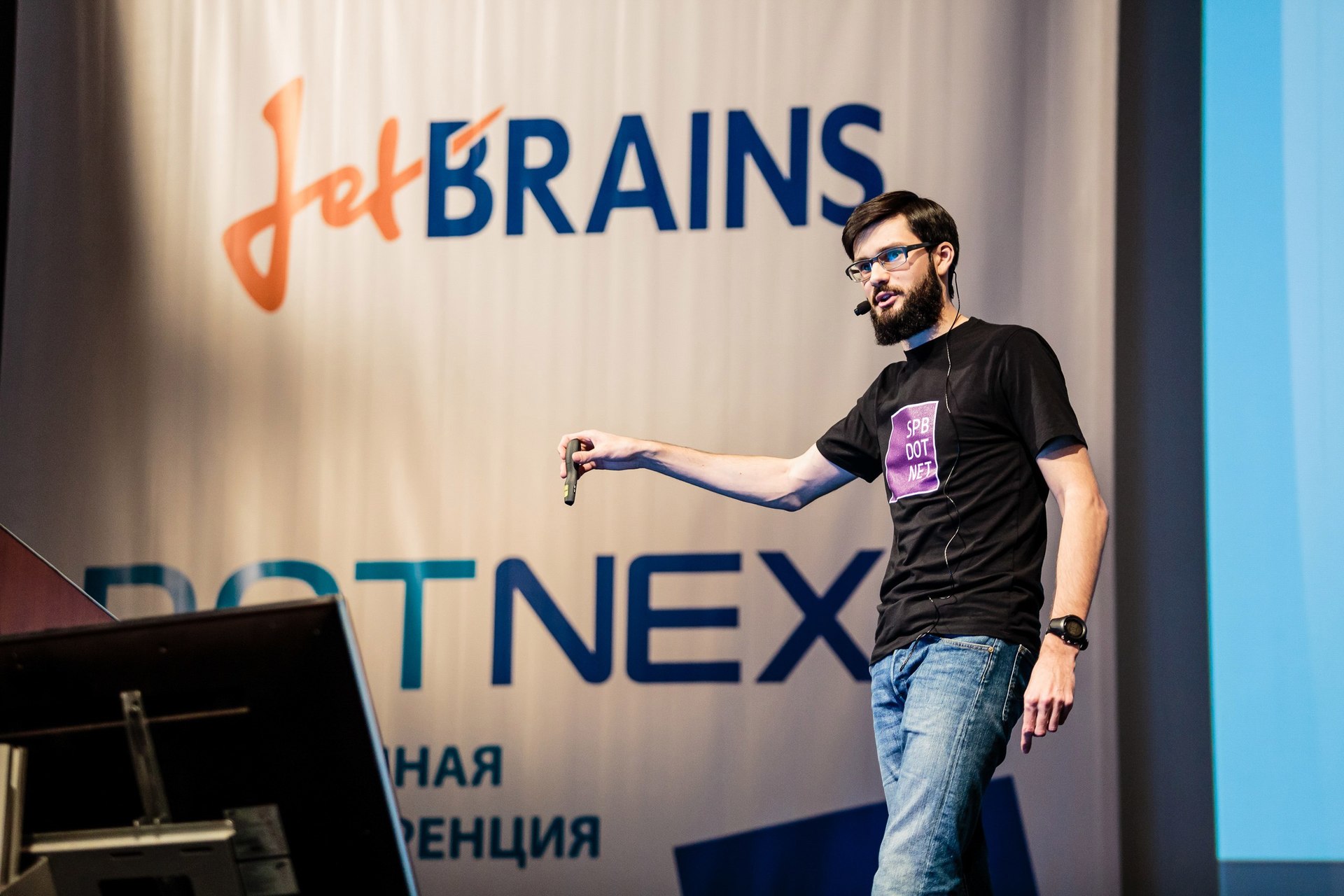
And in the main hall at the same time, Mikhail Shcherbakov (Cezurity) talked about the use of WinDbg when working with .NET. He is well-known in St. Petersburg .NET-community, because his spbdotnet.org and turns many programmers into a community where people know each other and meet to share experiences. But living in other cities, his project can also be useful - thanks to online broadcasts. It was easy to learn Michael - his T-shirt spoke for itself.
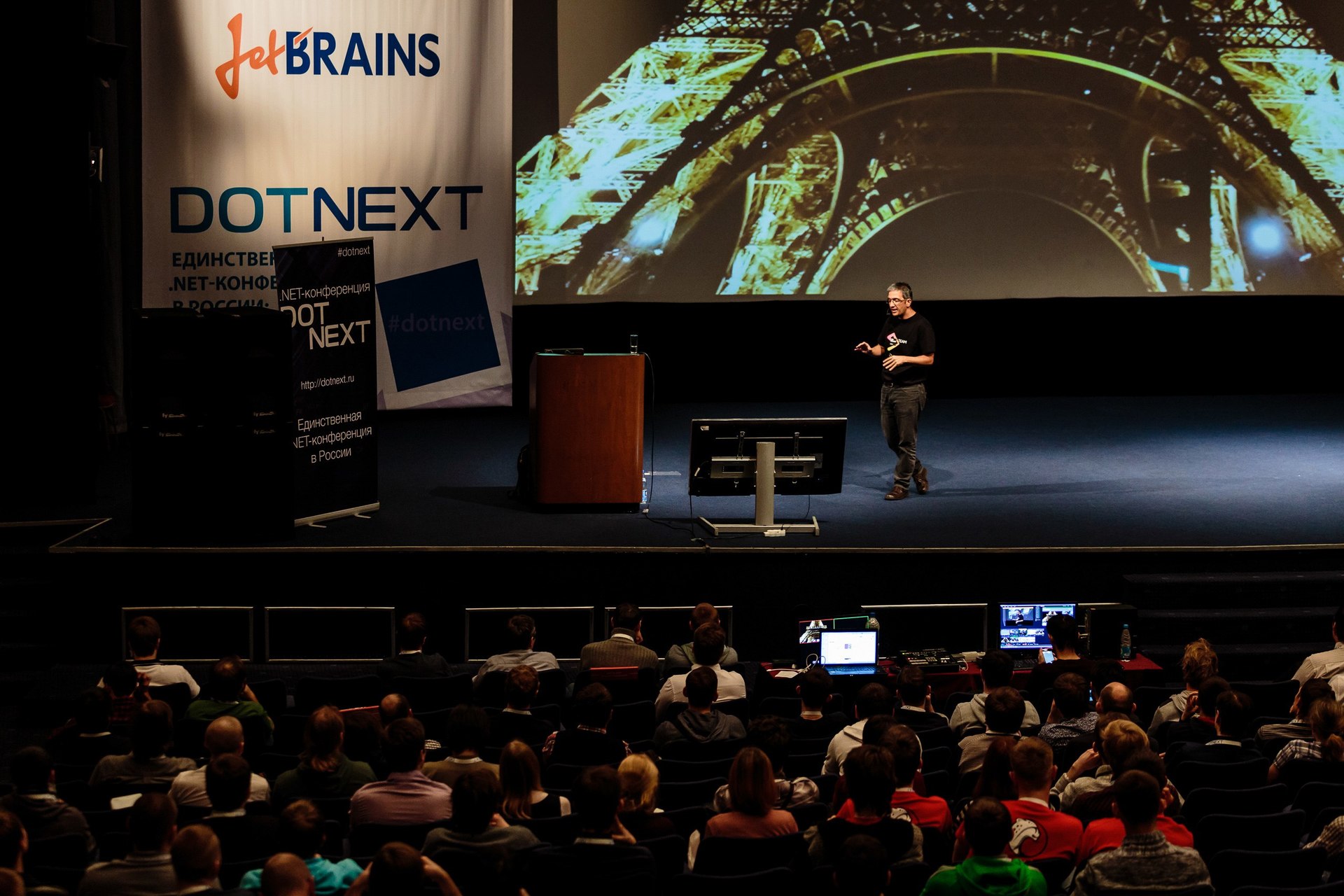
Finally, he closed the keynote conference from Hadi Hariri about “silver bullet syndrome” - the tendency to proclaim any technology or approach, whether at least Microservices, even the same Domain-Driven Design (Dino, by the way, listened with interest). Without being embarrassed in expressions, Hadi recalled how one after another was said “this will finally fix everything,” after which a breakthrough of new difficulties arose. And also drove by the way developers say something like “Netflix started using it? We will then be there too, ”without really thinking about the fact that Netflix and their project have completely different specifics.
According to the audience reaction, it was clear that they also had to deal with the excessive impressionability of the IT world, who so much likes innovations and wants to “solve the problem once and for all” so much that they place unjustified expectations on everything and start hyip from scratch, and the number of options tends to infinity. Hadi’s slides were filled with ironic quotes about it - like the tweet “ Drinking game for web developers: think up a word, google“ word.js ”, if you find a library with this name - drink it”.
At the same time, as the speech made it clear, saying “I will not try anything new” is also not an option - what people expect too much from new products does not negate the fact that progress happens. It remains to be balanced with what is happening and try to evaluate the real advantages, not loud words.
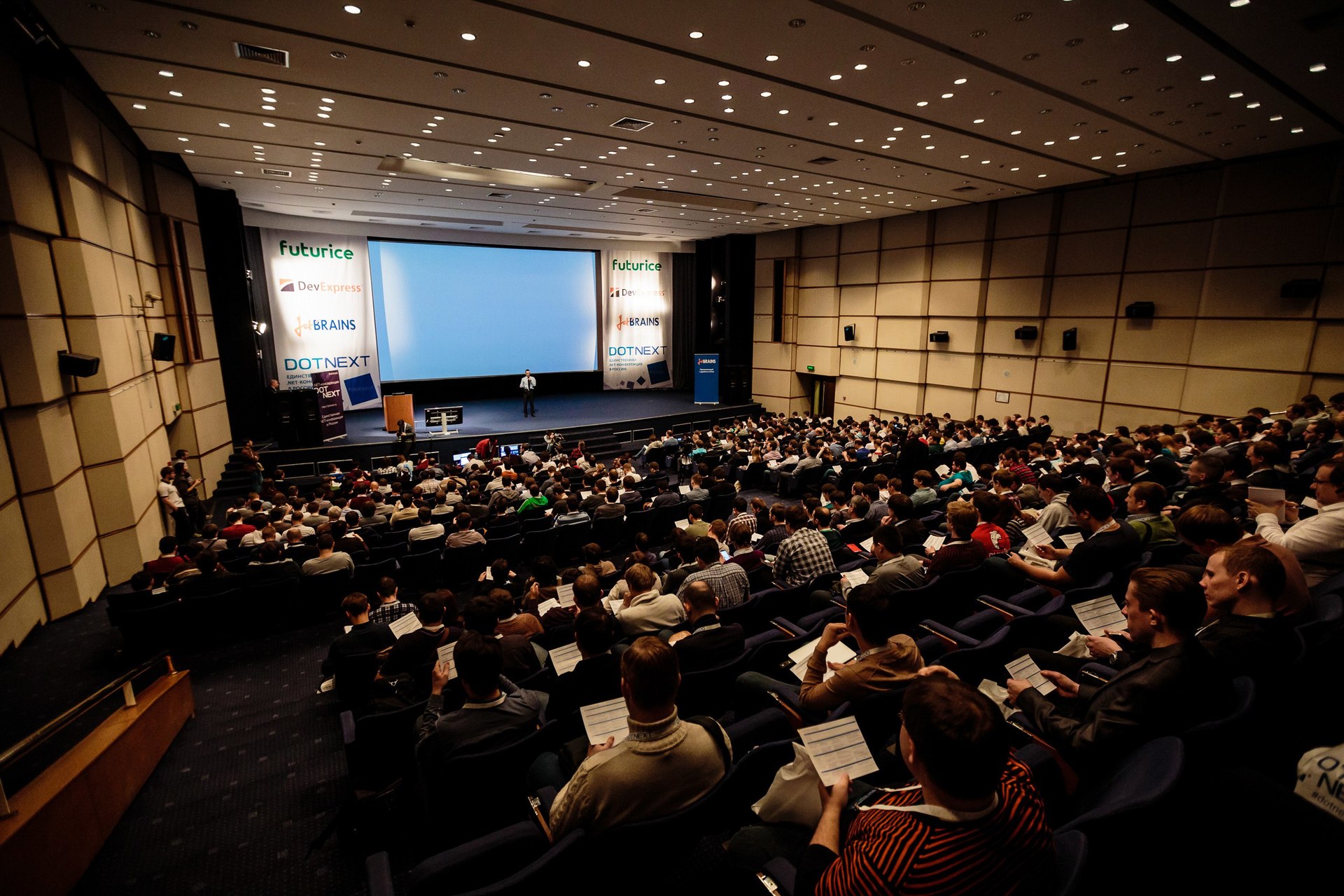
What is the result? DotNext provided what was last time (a lot of hardcore, a lot of JetBrains, a headliner in the person of Dino Esposito), and something else: a lot of speeches in English (including both the most ambitious: opening and closing), three hall instead of four last year’s, more reports from the community. It can be summed up - the conference is evolving, and the whole Russian .NET community is evolving with it.
To paraphrase a classic, if foreign stars are invited, it means that someone needs it. The demand for English-speaking speeches shows that both the level of mastery of the topic among Russian dotnetchiki and interest in this topic (in a foreign language, people usually get acquainted with what they are really interested in), and the reluctance to close themselves up in small games: people want to hear the best reports from possible, and the rest is particular.
Is this not a reason to rejoice?
The answer to this question is in the detailed story about the last conference under the cut.

')
Nothing has changed with the venue: everything happened in the renowned halls of the Radisson Slavyanskaya. Among the companies whose stands are located in the lobby, appeared Kaspersky Lab. She was also more ingenious in attracting attention: at the Kaspersky stand, they were allowed to try out the game for the Samsung Gear VR helmet, which did not have a month to go, and there was no shortage of people willing to try the novelty.

However, since they come to this conference on business, other stands also did not stand idle. Say, DevExpress doesn’t seriously lure everything with virtual reality, and the company name says nothing to people from the outside, but its products are important for DotNext visitors, so they were active.

Well, at the Futurice booth one could talk about possible employment in Helsinki, Berlin, Munich, London and Stockholm - the company's offices are located in different European cities. Mikhail Samarin , business director of Futurice, systematically speaking at DotNext, does not hide the fact that the conference attracts him with the ability to search for talented personnel for the company - he spoke about this not only at the stand, but also from the stage.

And the JetBrains stand, which always attracts the attention of developers, looked unexpectedly this time too: exactly on the day of the conference, the company had a rebranding , so there was a new logo instead of the usual logo on the stand.

Like last year, keynote was English-speaking, and again Dino Esposito , famous in the .NET world, again made him talk about Domain-Driven Design. His expressive manner remained unchanged: “We started talking about DDD thanks to the book by Eric Evans, published in 2004, more than ten years ago. Do you understand what it means in the programming world? This is the book of the YURS PERIOD. ” The image was complemented by a New Year's cap.
In Esposito's speech, there was also a reference to George Orwell's Animal Farm, and a story about how, after the Las Vegas conferences, he had to “prove to his wife that he went there to work,” and regret that the customer cannot be told to “pay I'm more for the fact that my code is elegant ”- but at the same time he did not forget about the main theme. His performance was not a blatant praise for the Domain-Driven Design approach: it was directly stated in the speech that this approach would not be a panacea for all problems.

After the keynote, everyone dispersed in different rooms. While the same Mikhail Samarin explained what the appearance of the Universal Windows Platform means, Dmitry Nesteruk from JetBrains talked about the basics of creating bots that automate almost any manual operations.
It may seem that the recently appeared UWP requires a presentation, and in the case of bots, nothing changes, but Dmitry gave an example of a fresh situation that made them more relevant: the take-off of instant messengers like Slack and Telegram led to the flourishing of bots that could be useful in the dialogue mode. Although bots may seem to be an intuitive topic (anybody came across spam bots), those who didn’t write them could give a lot of news: for example, the idea of a hybrid approach is not obvious, the bot performs its own part of the task, but at a certain stage, the reins of government are transmitted to a living user (although I want complete automation, if it is impossible, it will be partially better than any).

The next time slot became special: while Dino Esposito talked about the Domain Model, in another room Sasha Goldstein (Sela Group) , known in the .NET world for his book “Pro .NET Performance” , spoke about vectorization - so just two simultaneous reports Were in English, which did not happen on DotNext before. However, this does not mean that the thirsty for Russian speech had nothing to listen to at this time: for example, Nikita Governors from DevExpress talked about Xamarin.Forms , which allows mobile interface to easily port the interface to all three main platforms (iOS, Android, Windows). Since only one and a half years have passed since the advent of this technology, in the past Moscow DotNext no one could simply tell about it on the basis of long-term personal experience, and here Nikita summed up the year of active work - while frankly speaking about those moments in which the service caused inconvenience.
For example, if in iOS, single-line and multi-line text entry fields are different, then in Android it is a single entity, and as a result, Xamarin.Forms, with its desire for universality, simply does not have access to single-line in iOS. There are not so obvious, but also significant inconveniences: according to Nikita, the developers of Xamarin.Forms like to put significant changes in minor updates and even not to communicate clearly about them. An honest story about both pros and cons is what could help those present to understand how the service suits their particular project.

After lunch, the report in the main hall became a real show: there were two speakers, and a powerful confrontation unfolded on the scene. Roman Belov (JetBrains) immediately honestly admitted that he “switched to the dark side of the Force”: .NET is familiar to him not by hearsay, but now he prefers the Java platform (it’s scary to say this in person to hundreds of dotnetchikov) and participates in the development of the Kotlin language. Dmitry Ivanov , on the contrary, was on the “light side”.
Together, they built the entire report on comparisons of two worlds - and they came so meticulously that all the slides were divided in half into “dark” and “light” halves, and even their clothes corresponded to this. As usually happens in such programmer holivarahs, there was no one-sided dominance of one party over the other - but in the process of their confrontation, viewers could learn something about both of them. There were moments when the hall laughed amicably: “we call this operator“ I swear to my mother! ”

The next English-speaking speaker appeared in the next block: Hadi Hariri from JetBrains talked about HTTP / 2. If you are not interested in the question, it may seem that “the new version of the protocol is so important when the Internet is faster without it,” but the report quickly explained: the question is not throughput (capacity), the question is latency. You can quickly download giant files, but for a bunch of small files (with which we are dealing with HTTP now), this is not the case. If the beginning of the download of each small file is preceded by a delay, then it will constantly be felt. HTTP / 2 is designed to solve this problem and simplify the lives of developers who use HTTP 1.1 in their tricks. However, there are also some tricks and difficulties in the case of the new version of the protocol - and they are also about. In the end, Hadi recommended to everyone who wants to understand the subject more deeply, the book by Ilya Grigorik “High-Performance Browser Networking” .
Then Sasha Goldstein spoke for the second time that day - this time he spoke about the automation of error handling. As he noted, of course, you can manually disassemble hundreds of crash dumps, but this requires a lot of working time and at the same time means a large amount of mechanical “computer-like” work - so it makes sense to entrust this work to a computer. The report was devoted to exactly how to do it.

In the penultimate slot there were two reports at once, remarkable not only by topics, but also by speakers. “Functional programming on F # in big data processing and machine learning” is important at least because of how actively machine learning now declares itself, and Dmitry Soshnikov from Microsoft was talking about it - so without a company with which the name itself is instantly associated .NET, the conference has not done.

And in the main hall at the same time, Mikhail Shcherbakov (Cezurity) talked about the use of WinDbg when working with .NET. He is well-known in St. Petersburg .NET-community, because his spbdotnet.org and turns many programmers into a community where people know each other and meet to share experiences. But living in other cities, his project can also be useful - thanks to online broadcasts. It was easy to learn Michael - his T-shirt spoke for itself.

Finally, he closed the keynote conference from Hadi Hariri about “silver bullet syndrome” - the tendency to proclaim any technology or approach, whether at least Microservices, even the same Domain-Driven Design (Dino, by the way, listened with interest). Without being embarrassed in expressions, Hadi recalled how one after another was said “this will finally fix everything,” after which a breakthrough of new difficulties arose. And also drove by the way developers say something like “Netflix started using it? We will then be there too, ”without really thinking about the fact that Netflix and their project have completely different specifics.
According to the audience reaction, it was clear that they also had to deal with the excessive impressionability of the IT world, who so much likes innovations and wants to “solve the problem once and for all” so much that they place unjustified expectations on everything and start hyip from scratch, and the number of options tends to infinity. Hadi’s slides were filled with ironic quotes about it - like the tweet “ Drinking game for web developers: think up a word, google“ word.js ”, if you find a library with this name - drink it”.
At the same time, as the speech made it clear, saying “I will not try anything new” is also not an option - what people expect too much from new products does not negate the fact that progress happens. It remains to be balanced with what is happening and try to evaluate the real advantages, not loud words.

What is the result? DotNext provided what was last time (a lot of hardcore, a lot of JetBrains, a headliner in the person of Dino Esposito), and something else: a lot of speeches in English (including both the most ambitious: opening and closing), three hall instead of four last year’s, more reports from the community. It can be summed up - the conference is evolving, and the whole Russian .NET community is evolving with it.
To paraphrase a classic, if foreign stars are invited, it means that someone needs it. The demand for English-speaking speeches shows that both the level of mastery of the topic among Russian dotnetchiki and interest in this topic (in a foreign language, people usually get acquainted with what they are really interested in), and the reluctance to close themselves up in small games: people want to hear the best reports from possible, and the rest is particular.
Is this not a reason to rejoice?
Source: https://habr.com/ru/post/273905/
All Articles